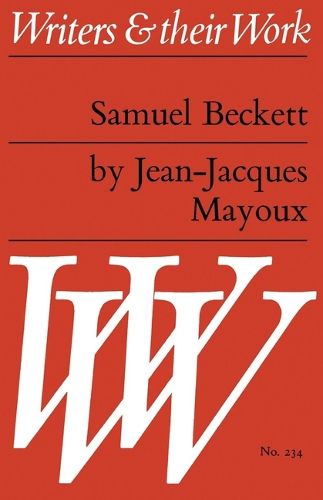Readings Newsletter
Become a Readings Member to make your shopping experience even easier.
Sign in or sign up for free!
You’re not far away from qualifying for FREE standard shipping within Australia
You’ve qualified for FREE standard shipping within Australia
The cart is loading…






A well-known English author has told the story of how he discovered one of Beckett's early novels in a London public library. He appropriated the copy because the date-stamp revealed that it had only been borrowed once in the fifteen years following its publication. Samuel Beckett, who was awarded the Nobel Prize for Literature in 1969, has remained for most of his career a difficult an avant-garde writer; but like his compatriot, James Joyce, he has wielded a more potent literary influence than many authors who command a far wider public.
The discoveries of
modern science and mathematics have intensified the human awareness of the infinite and Beckett himself is peculiarly sensitive to the idea that man is 'a scrap of life surrounded by death, a something that encircled by nothing'. Both his novels and his plays have a predominantly philosophical bent: their aim is a search for the nature of reality rather than the construction of plausible fictions. Beckett is much concerned with the difficulties of human communication and with man's doom of solitude, and he expresses these preoccupations through a symbolism of blindness, of immobility, of an existence stripped down to the bare essentials of nutrition and excretion: these images which he has made familiar through his plays convey a sense of dereliction which is undoubtedly attuned to the spirit of the post-war world. Yet at the same time he possesses the peculiarly Irish faculty for giving this desolate vision a comic dimension.
????Professor Mayoux's essay traces Beckett's literary development from his early poems through the novels to his plays for the theatre and the radio, and finally to the short, rigorously compressed fables or visions of the last few years. He notes Beckett's adoption of the French language for many of his writings, a choice which seems designed to emphasize the foreign-ness, the externality of all language. Like Ionesco, Beckett has never become a French writer, but remained an Irishman writing in French.
$9.00 standard shipping within Australia
FREE standard shipping within Australia for orders over $100.00
Express & International shipping calculated at checkout
A well-known English author has told the story of how he discovered one of Beckett's early novels in a London public library. He appropriated the copy because the date-stamp revealed that it had only been borrowed once in the fifteen years following its publication. Samuel Beckett, who was awarded the Nobel Prize for Literature in 1969, has remained for most of his career a difficult an avant-garde writer; but like his compatriot, James Joyce, he has wielded a more potent literary influence than many authors who command a far wider public.
The discoveries of
modern science and mathematics have intensified the human awareness of the infinite and Beckett himself is peculiarly sensitive to the idea that man is 'a scrap of life surrounded by death, a something that encircled by nothing'. Both his novels and his plays have a predominantly philosophical bent: their aim is a search for the nature of reality rather than the construction of plausible fictions. Beckett is much concerned with the difficulties of human communication and with man's doom of solitude, and he expresses these preoccupations through a symbolism of blindness, of immobility, of an existence stripped down to the bare essentials of nutrition and excretion: these images which he has made familiar through his plays convey a sense of dereliction which is undoubtedly attuned to the spirit of the post-war world. Yet at the same time he possesses the peculiarly Irish faculty for giving this desolate vision a comic dimension.
????Professor Mayoux's essay traces Beckett's literary development from his early poems through the novels to his plays for the theatre and the radio, and finally to the short, rigorously compressed fables or visions of the last few years. He notes Beckett's adoption of the French language for many of his writings, a choice which seems designed to emphasize the foreign-ness, the externality of all language. Like Ionesco, Beckett has never become a French writer, but remained an Irishman writing in French.